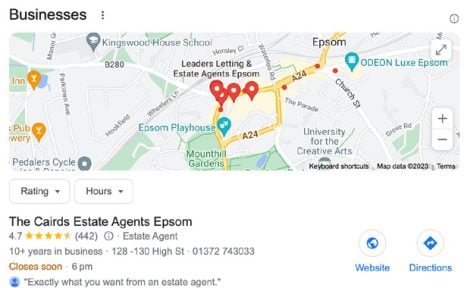The word on the street
Making your agency’s voice heard is a challenge, says Charlotte Flake, but having a carefully curated content strategy can bring discoverability, brand loyalty and lead generation.

Content marketing, specifically, goes beyond that, and utilises low or no cost activities, usually via an agent’s own platform initially, to speak directly to their target customer, building trust and encouraging engagement, which will in turn and over time, bring in business. The problem is that content production requires resources and time – two things that can be hard to come by. The key is careful planning and consistency, say the experts.
Fail to plan, plan to fail
 “No one thing works in isolation. Everything starts with a solid plan and a clear vision,” says Art Division’s Nelly Berova. “The main question to ask is what is the goal? Is it to reach and engage with more prospects? Is it to build a larger email list? Or to attract conversions?
“No one thing works in isolation. Everything starts with a solid plan and a clear vision,” says Art Division’s Nelly Berova. “The main question to ask is what is the goal? Is it to reach and engage with more prospects? Is it to build a larger email list? Or to attract conversions?
The main question to ask is what is the goal? Is it to reach and engage with more prospects? Is it to build a larger email list? Or to attract conversions? Nelly Berova, Art Division.
“One type of content cannot do everything, so make sure you are clear on what you expect from your content strategy and measure against it. For example, if your blogs aim to rank and attract more prospects to your website, then the goal will be to increase your traffic, engagement and your email subscribers. For this you need to have planned calls to action within your blog, encouraging prospects to consume a gated piece of content – for example, an instant valuation.”
 Ben Sellers, Co-Founder of Starberry, which is part of Nurtur.group, agrees. He says agents should, “create a content strategy based on the business’s required outcome and KPIs.”
Ben Sellers, Co-Founder of Starberry, which is part of Nurtur.group, agrees. He says agents should, “create a content strategy based on the business’s required outcome and KPIs.”
Because a content strategy can vary depending on budget, time, preferred channels and number of products and services an agent might have, Ben recommends keeping it focussed. “Pick low hanging fruit [by utilising] Google Local to build confidence in digital marketing and to help get the business engaged in supporting a multi-channel content strategy.
You need to agree on where the business needs help, where the money is made, where the strengths lie and indeed, gaps or weaknesses that need supporting and building up. Ben Sellers, Starberry.
“You need to agree on where the business needs help, where the money is made, where the strengths lie and indeed, gaps or weaknesses that need supporting and building up.”
 Amanda O’Brien at Content For says a content strategy should not only align with your business goals, but those of your target audience. “Identifying and focusing on content themes is a crucial step in developing a content marketing strategy. Agents should think of themes as lots of different pots of topics that align with their own goals and their audience’s needs, because then it’s easier to plan ahead.
Amanda O’Brien at Content For says a content strategy should not only align with your business goals, but those of your target audience. “Identifying and focusing on content themes is a crucial step in developing a content marketing strategy. Agents should think of themes as lots of different pots of topics that align with their own goals and their audience’s needs, because then it’s easier to plan ahead.
Agents should think of themes as lots of different pots of topics that align with their own goals and their audience’s needs, because then it’s easier to plan ahead. Amanda O’Brien, Content For.
“Agents need a mix of content that isn’t random – but is carefully thought out and curated – then published in such a way that it wiggles its way into the subconscious of the audience! So, for agents, themes might include content on selling or moving tips for home movers, lifestyle topics related to interiors, garden and home and property market updates.”
Easy idea generation
One thing is certain, there’s an awful lot to talk about in property, so agents should never be short of something to say. The challenge lies in choosing and planning topics, producing regular and original content and planning an effective distribution strategy.
A good baseline, says Ben, is communicating with a broad set of persons in mind, “from first-time buyers and investors to downsizers and more. Case studies are great for demonstrating problems, solutions and results” he adds. “Customer testimonials and video reviews give social proof and community-related activity. Knowledge-sharing positions you as an expert in your locality – fuelling your Google visibility locally. Sharing your USPs, market reports, results and people are also great sources of content.”
 Jerry Lyons, Founder of Estate Agent Content, is also a big believer in community content. “Community content is gold. Highlight what’s happening locally, feature local businesses and support local community groups and charities,” advises Jerry.
Jerry Lyons, Founder of Estate Agent Content, is also a big believer in community content. “Community content is gold. Highlight what’s happening locally, feature local businesses and support local community groups and charities,” advises Jerry.
He also recommends a ‘top ten’approach. “Compile the ten most asked questions your team are being asked and create ten pieces of content based around the answers. This can be in article or video form, but ideally both.
It’s very, very rare to find a sales negotiator who likes writing to have the same skill level of an experienced journalist or copywriter, so be careful who does your content. Jerry Lyons, Estate Agent Content.
“Answer your audience’s questions in the most honest way possible. Even if that means highlighting why your agency might not be the best fit for their needs.
“Before creating any piece of content though, run it through the HITS test – is it Helpful to your audience, is Interesting enough to warrant attention, is it Trustworthy in that it’s accurate and can you commit to a Sustainable amount of content being shared, at least two to three times a week?”
Critical content characteristics
 Pernilla Tweddle, Marketing Director of PropertyStream, a specialist branding, website and marketing agency for the sector, also emphasises quality over quantity. She claims that two of the most important components of agent content is that it’s user friendly and useful.
Pernilla Tweddle, Marketing Director of PropertyStream, a specialist branding, website and marketing agency for the sector, also emphasises quality over quantity. She claims that two of the most important components of agent content is that it’s user friendly and useful.
Your website should contain easy-to-absorb, helpful content for your customers and potential customers, not be over-stuffed with keywords and written purely for search engines. Pernilla Tweddle, PropertyStream.
“Google’s Helpful Content updates in 2022 were designed to reward websites that produce high-quality content written for people – not search engines – and that is welcomed news,” she says.
“Your website should contain easy-to-absorb, helpful content for your customers and potential customers, not be over-stuffed with keywords and written purely for search engines.
“The phrase ‘what are the steps in selling a house’ gives 454 million results in Google. People are using Google, YouTube and social platforms to discover, learn and educate themselves every day. That includes their property experience. They will be looking for articles, videos, downloadable factsheets, guides, checklists and jargon busters so make sure your content mix caters for their needs.”
Originality
Another key component, says Pernilla, is originality – something that the advent of AI is potentially threatening. And she is not alone in the idea that this does not provide a simple solution. “AI is great for finding ideas and giving a base to build upon,” comments Jerry. “It’s not so good at adding humour, being up to date (yet) and it can’t give exclusivity. But it’s very, very rare to find a sales negotiator who likes writing to have the same skill level of an experienced journalist or copywriter, so be careful who does your content.
“The number one thing we recommend agents seek, if outsourcing, is a guarantee that rivals in their area can’t access the same content. If two or three agents in the same town have the same content, it confuses the audience and damages brands.
Amanda also believes outsourcing is the most effective route for agency content creation.
“Where possible, estate agent content should be professionally written by a writer who is familiar with the estate agent industry – a human one, not AI,” says Amanda. “Great content creation requires a combination of different skill sets and not every estate agent will be in possession of those! We can’t all be good at everything so it’s important to stay in your own lane and concentrate on what you’re good at!
“The ability to write, research and translate hard facts, create engaging copy, and turn it into an interesting read while communicating different emotions is not easy, but a freelancer or estate agency industry expert writer will be able to dedicate the time to do exactly this.”
AI is tone deaf Although
Nelly warns that regardless of whether you create content in-house, outsource or take a hybrid approach, developing a tone of voice is important for consistency. She comments, “If you have recently come across ChatGPT and think that this will replace your writer – think again. Even if you can use AI to research facts or write certain paragraphs, you still need someone to fact check and edit this content and ensure it’s written with your tone of voice and intent in mind.
“Having a documented tone of voice guide helps to maintain your brand’s message and reputation, whilst ensuring that your company’s personality comes across in any communications with your audience. Having a tone of voice that the entire business is familiar with also helps your audience to feel at ease and know what to expect from you. If you don’t have a tone of voice, you run the risk of discrepancies cropping up across channels and it may impact how consumers interact with you or interpret your business.
Creating a tone of voice is something that should be done when developing brand guidelines, says Ben. “Don’t just create a logo, colours and fonts – develop a Mission & Vision – and tone of voice based on the archetypes the business believes,” advises Ben. “Describe them and decide whether you want to be communicating in a formal manner – professional, serious, relaxed, friendly, educational. By asking these questions, you can start to pick out what resonates with your business and start to fine tune the tone of voice.
“We often ask clients to find sites from outside of the property market that they like and their preferred tone of voice in emails etc – this again helps you on a journey to finding your tone of voice.
The perfect mix
And while on the topic of consistency, the rule applies to frequency and distribution too. A multichannel approach and the more touch points, the better, claim the experts. All advise agents who are just starting out on their content marketing journey to aim for at least daily social posts, a weekly blog and monthly newsletter.
Amanda says, “Mixing up the type of content agents put out is crucial. Audiences digest content in different ways and so it’s not a one-size-fits-all. Some people like to watch a video, some like to read articles, some like a quick snippet of scannable bullet points, so all of these should be covered. What’s important with any of these methods though, is making sure your audience gets what they want from the content quickly and easily.”
Pernilla agrees that whatever content and channels you choose, they must be suitable for your target customer. “Your content needs to include a balanced mix of formats and used across a range of platforms and channels,” she comments. “This is because estate agent clients are typically from a diverse and far-reaching demographic and age range – from urban first-time buyers in their 20s to retiring couples in the rural countryside and everyone/ everywhere in between.
“Consider both online and offline channels; I am a strong advocate in retaining print marketing as part of your marketing mix, such as canvassing flyers and letters, as a lead generating tool. In fact, many agents tell us direct mail still drives a huge amount of valuations.
“That said, video is a must in your content mix and is by far the fastest growing and most consumed medium; 72% of customers said they would rather learn about a product or service by way of video. Moving content is an excellent way to engage with your audience, deliver clear messages and promote your brand. Videos can also drive 2 to 3 times higher CTRs (click-through-rates) than static visuals so they’re highly recommended.”
Ben echoes the importance of video and demonstrates how it can be repurposed easily: “Video is king, with 400% higher engagement than any other content type, but you need words on the page for that video to be found on Google. If you have a great strategy, you will have a concept, which will be a story. That can be converted into a video, cut up into social posts and email marketing and then drive you to the evergreen content on your website that produces more engagement and converts to business.” Amanda adds, “In simple terms, content marketing is a way of consistently building trust with a target audience through educational, inspirational, and problem-solving content. The more you give, the more trust you receive and of course if you have an audience that trusts you, it’s easier to turn them into a client!”
If content marketing is new to you, then Pernilla has sound advice for a quick start. “Look at offline content you already have. Information in your valuation pack or selling brochures can create several good social media posts, videos or digital assets. Turn your brochures into downloadable PDFs and share on your website, social channels and email marketing. Maximise these great assets and include them in your content strategy.”




